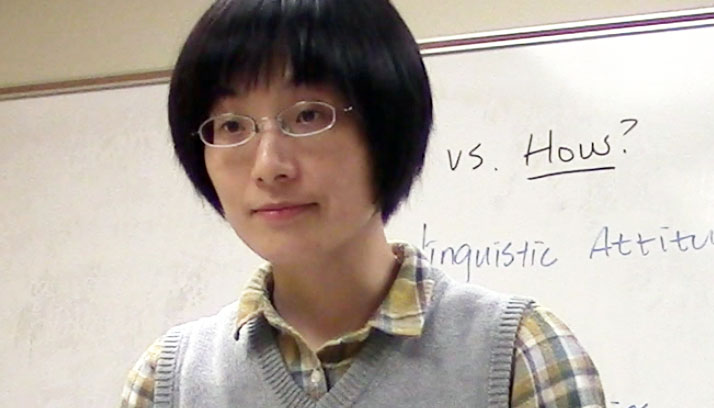 Yi-Ju Lai is a Ph.D. candidate in Second Language Education in the Department of Curriculum and Instruction. She is driven to understand the complicated role of international teaching assistants, and the communication challenges they face in the university community.
Yi-Ju Lai is a Ph.D. candidate in Second Language Education in the Department of Curriculum and Instruction. She is driven to understand the complicated role of international teaching assistants, and the communication challenges they face in the university community.
What drove you to enroll in the Second Language Education Ph.D. program? (a little background on how you came to us).
I have a background in applied linguistics and its application to language education. During one of my projects researching how academic language is learned and used among multilingual international students in U.S. higher education, I became more and more interested in the theories of linguistic anthropology and their applications to language acquisition and language use in different contexts. I decided to pursue a Ph.D. degree to sharpen my research skills and develop my knowledge of linguistic anthropology. One of the Second Language Education Ph.D. program focuses is language acquisition and language use in a range of contexts and settings, which drove me to join this research community.
What is your current research focus?
A major issue on U.S. campuses is miscommunication between university students and their international teaching assistants (ITAs) who lack knowledge of U.S. classroom interactions. My current research project uses language socialization theory–– the study of the interrelated processes of language and cultural development–– to examine: (1) ITAs’ language socialization experiences in U.S. graduate schools and (2) language use between ITAs and their U.S. university students, and the classroom interactional challenges facing them. It also looks at how institutional cultures shape those language use and classroom interactions. In addition, my current project explores how ITAs are positioned simultaneously as content experts and language novices in everyday instructional interactions with their university students.
When did you become interested in applied linguistics, or linguistic anthropology, particularly language socialization?
As a life-long language learner, I am always interested in how language is learned, how language is used verbally and nonverbally in diverse contexts, and how language shapes the way people understand the world. My first class in the field of linguistic anthropology inspired my research interest in language socialization and brought an interdisciplinary approach to my study considering language as a form of social action.
What do you hope to do after graduation?
I will seek a position that allows me to continue my language socialization research and support meaningful cross-cultural communication in higher education contexts between multilingual international students and their U.S. professors and students.
Which resources have you found through the department to help with your research?
My research has been benefited from C&I travel grants, pro-seminars, emerging scholars conference/ research day, graduate student organizations, and conversations with colleagues and faculty members. In addition, the collaborative work between the department and UMN institutions (e.g., Center for Advanced Research on Language Acquisition, Center for Educational Innovation) has also helped deepen my research.
When did you come to the United States? Has your experience affected your research?
I have been studying and teaching/working in the United States for more than ten years. My experiences have encouraged me to re-think how multilingual practices cross-cultural communication can be achieved among speakers with diverse backgrounds.
What has been your favorite part of living in Minnesota?
It is interesting and meaningful to observe and learn how languages are used in communication among diverse populations in Minnesota, and how those language varieties may represent individual’s lived experiences and reflection of the society.
Learn more about second language education research and the Ph.D. program in Second Language Education in the Department of Curriculum and Instruction.



